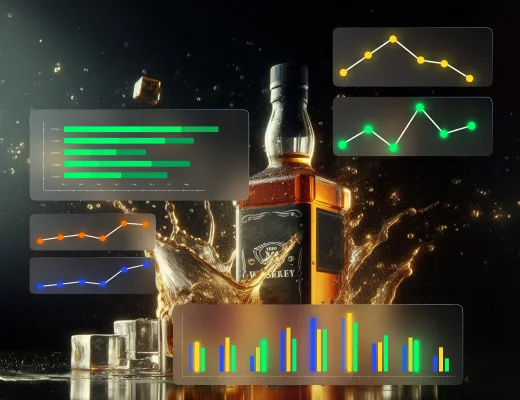
Distill data, ferment insights, and taste the results
From neural networks to non-linear regressions leverage AI engines to power your alcoholic beverage analytics
Move beyond the basic elasticity and forecasting models for analytics in alcoholic beverages. Now embrace a dynamic approach for S&OP, demand, capacity, and supply planning. From clustering to attributing factors predict what?s right for you!
Capitalize the impact of changing trends like RTD, at-home drinking, premiumization, etc. with the right market mix strategies

Go beyond the Bayesian optimizations and get multi-variable non linear strategies to identify the right attributions and impacts.

Gauge the effectiveness of sales strategies, identify distributors for restocking, or to identify the best complementary products

Eliminate unclear plans, slow payouts, unauthorized discounting, and potential disincentives. Leverage AI/ML techniques to enable:

Enable digital supply chain networks with Demand & Supply Planning Centre, Inventory, Warehouse, and Logistics towers, Material Management, Fulfillment Tower, & On Time In Full Towers

From managing the changing tastes of new-age drinkers to tailoring recommendations for growing sales, our Spirits AI ecosystem can help with data analytics in alcoholic beverages by:

At Polestar Analytics, we bring carefully curated insights using statistical techniques and ML models to uncover trends and correlations for pricing optimization, customer behavior, bottling efficiencies, and more. We work have worked on activities related to:
Though it is difficult to get into the exact techniques without knowing the use case. Some of the most known AI techniques used in spirits industry are: Predictive analytics, utilizing regression analysis and time series forecasting, helps forecast sales trends and consumer demand. Machine learning techniques, such as classification algorithms (e.g., decision trees, random forests), enable effective customer segmentation and targeted marketing. Recommendation systems like collaborative filtering or content-based filtering are useful for suggesting products tailored to individual preferences. New age Generative AI is being used to create new flavor combinations, assist sales with chatbots, etc. If you’re interested in any more specific use cases, feel free to reach out to us!
Some of the Financial Performance KPIs include: Sales volume, Average selling price (ASP), Total revenue, Gross profit margin, EBITDA, Net income, etc. KPIs for Marketing and Sales Performance include: Market share, Brand awareness, Consumer purchase behavior, Promotion effectiveness, Distributor/retailer relationships. Operational KPIs include: Operational Performance, Production efficiency, Inventory turnover, Waste reduction, Supply chain management, etc. Other KPIs include: Investments in responsible drinking initiatives, Sustainability efforts, etc.
At Polestar Analytics we help you track the right KPIs based on your specific needs and requirements. Drop us a message to know more.
Some of the key steps of our implementation process for manufacturing include:
Further steps can be outlined based on your specific needs and requirements.